Review: Education in Unfamiliar Language & Teacher Proficiency Kenya
VerifiedAdded on 2023/06/05
|10
|2595
|306
Literature Review
AI Summary
This critical review examines the impact of teachers' limited English language proficiency on pedagogy in Kenyan primary schools, where English serves as a second language and medium of instruction. It highlights the challenges stemming from inadequate teacher training and the transition from Kiswahili to English in upper primary levels. The review discusses the failure of past training programs and the need for radical reforms to improve English language skills among teachers. It also addresses the broader context of educational initiatives like 'Education For All' and the importance of classroom interaction and learner-centered approaches. The review concludes by recommending globally recognized language programs and stricter English language requirements for teacher education to enhance academic proficiency and overall teaching standards in Kenya.
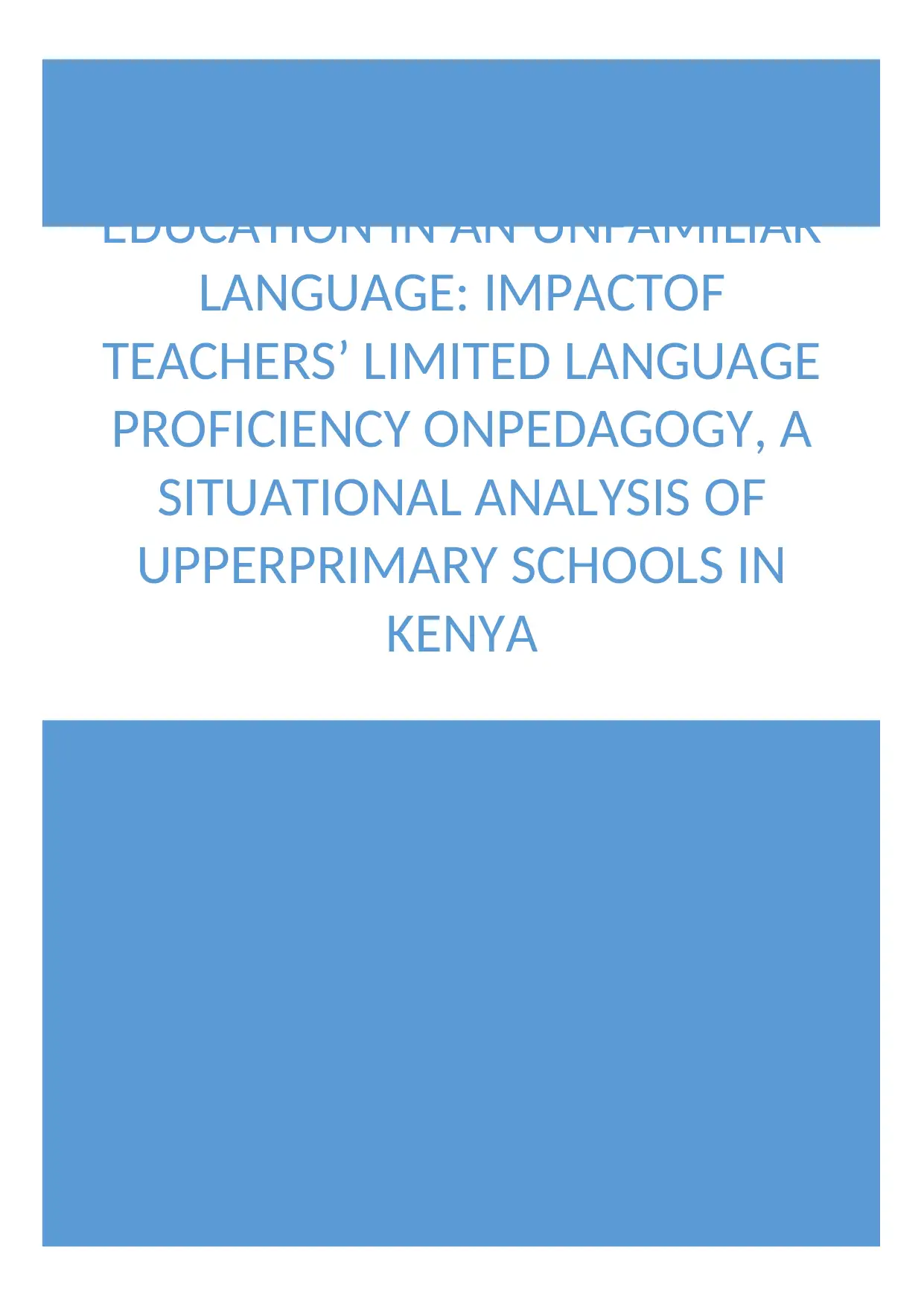
CRITICAL REVIEW OF
EDUCATION IN AN UNFAMILIAR
LANGUAGE: IMPACTOF
TEACHERS’ LIMITED LANGUAGE
PROFICIENCY ONPEDAGOGY, A
SITUATIONAL ANALYSIS OF
UPPERPRIMARY SCHOOLS IN
KENYA
EDUCATION IN AN UNFAMILIAR
LANGUAGE: IMPACTOF
TEACHERS’ LIMITED LANGUAGE
PROFICIENCY ONPEDAGOGY, A
SITUATIONAL ANALYSIS OF
UPPERPRIMARY SCHOOLS IN
KENYA
Paraphrase This Document
Need a fresh take? Get an instant paraphrase of this document with our AI Paraphraser

CRITICAL REVIEW: 1
Contents
Introduction...........................................................................................................................................2
Critical review of Education in an Unfamiliar Language: Impact of Teachers’ Limited Language
Proficiency on Pedagogy, a Situational Analysis of Upper Primary Schools in Kenya.........................2
Conclusion.............................................................................................................................................6
Recommendation...................................................................................................................................6
References.............................................................................................................................................7
Contents
Introduction...........................................................................................................................................2
Critical review of Education in an Unfamiliar Language: Impact of Teachers’ Limited Language
Proficiency on Pedagogy, a Situational Analysis of Upper Primary Schools in Kenya.........................2
Conclusion.............................................................................................................................................6
Recommendation...................................................................................................................................6
References.............................................................................................................................................7
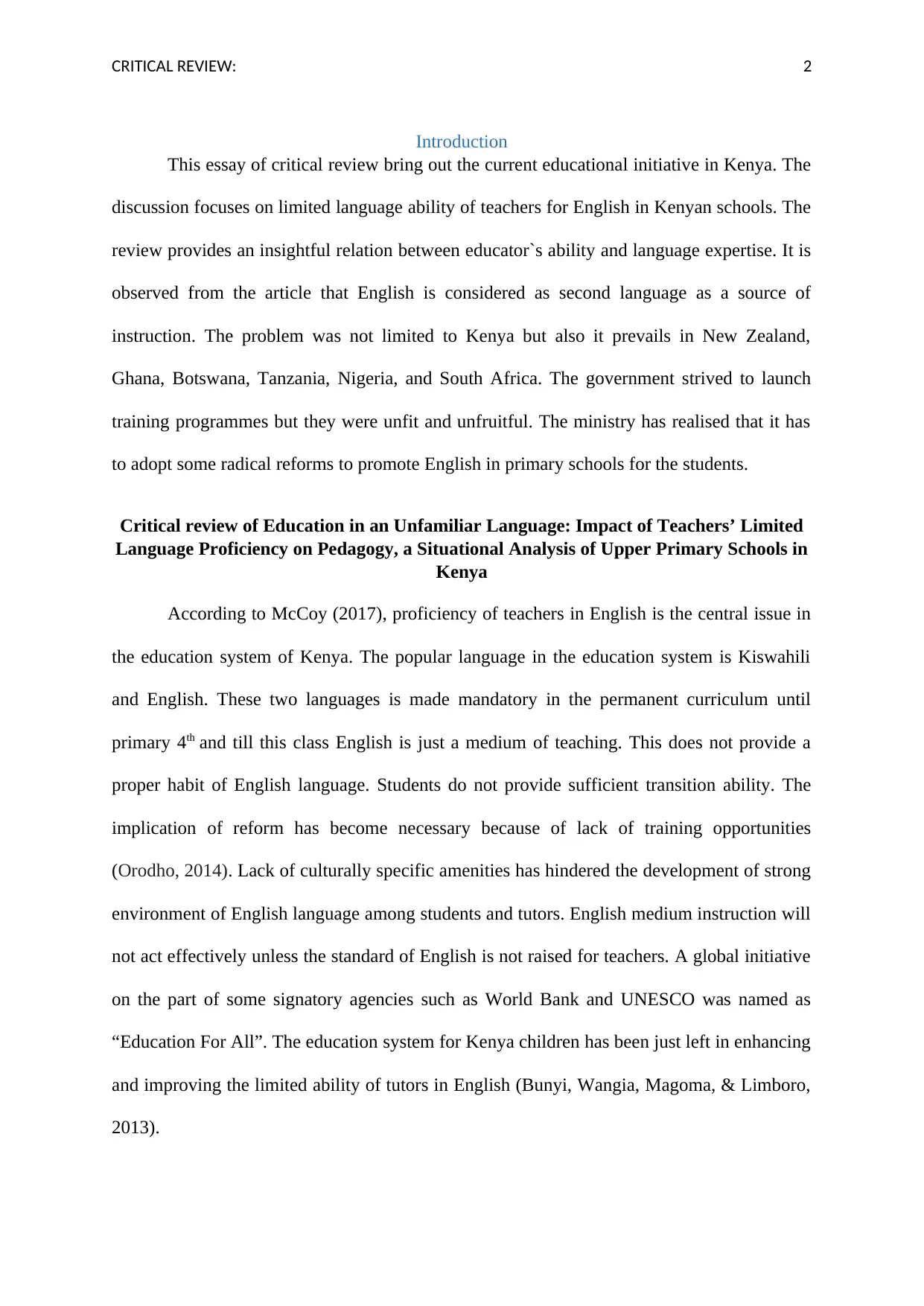
CRITICAL REVIEW: 2
Introduction
This essay of critical review bring out the current educational initiative in Kenya. The
discussion focuses on limited language ability of teachers for English in Kenyan schools. The
review provides an insightful relation between educator`s ability and language expertise. It is
observed from the article that English is considered as second language as a source of
instruction. The problem was not limited to Kenya but also it prevails in New Zealand,
Ghana, Botswana, Tanzania, Nigeria, and South Africa. The government strived to launch
training programmes but they were unfit and unfruitful. The ministry has realised that it has
to adopt some radical reforms to promote English in primary schools for the students.
Critical review of Education in an Unfamiliar Language: Impact of Teachers’ Limited
Language Proficiency on Pedagogy, a Situational Analysis of Upper Primary Schools in
Kenya
According to McCoy (2017), proficiency of teachers in English is the central issue in
the education system of Kenya. The popular language in the education system is Kiswahili
and English. These two languages is made mandatory in the permanent curriculum until
primary 4th and till this class English is just a medium of teaching. This does not provide a
proper habit of English language. Students do not provide sufficient transition ability. The
implication of reform has become necessary because of lack of training opportunities
(Orodho, 2014). Lack of culturally specific amenities has hindered the development of strong
environment of English language among students and tutors. English medium instruction will
not act effectively unless the standard of English is not raised for teachers. A global initiative
on the part of some signatory agencies such as World Bank and UNESCO was named as
“Education For All”. The education system for Kenya children has been just left in enhancing
and improving the limited ability of tutors in English (Bunyi, Wangia, Magoma, & Limboro,
2013).
Introduction
This essay of critical review bring out the current educational initiative in Kenya. The
discussion focuses on limited language ability of teachers for English in Kenyan schools. The
review provides an insightful relation between educator`s ability and language expertise. It is
observed from the article that English is considered as second language as a source of
instruction. The problem was not limited to Kenya but also it prevails in New Zealand,
Ghana, Botswana, Tanzania, Nigeria, and South Africa. The government strived to launch
training programmes but they were unfit and unfruitful. The ministry has realised that it has
to adopt some radical reforms to promote English in primary schools for the students.
Critical review of Education in an Unfamiliar Language: Impact of Teachers’ Limited
Language Proficiency on Pedagogy, a Situational Analysis of Upper Primary Schools in
Kenya
According to McCoy (2017), proficiency of teachers in English is the central issue in
the education system of Kenya. The popular language in the education system is Kiswahili
and English. These two languages is made mandatory in the permanent curriculum until
primary 4th and till this class English is just a medium of teaching. This does not provide a
proper habit of English language. Students do not provide sufficient transition ability. The
implication of reform has become necessary because of lack of training opportunities
(Orodho, 2014). Lack of culturally specific amenities has hindered the development of strong
environment of English language among students and tutors. English medium instruction will
not act effectively unless the standard of English is not raised for teachers. A global initiative
on the part of some signatory agencies such as World Bank and UNESCO was named as
“Education For All”. The education system for Kenya children has been just left in enhancing
and improving the limited ability of tutors in English (Bunyi, Wangia, Magoma, & Limboro,
2013).
⊘ This is a preview!⊘
Do you want full access?
Subscribe today to unlock all pages.

Trusted by 1+ million students worldwide
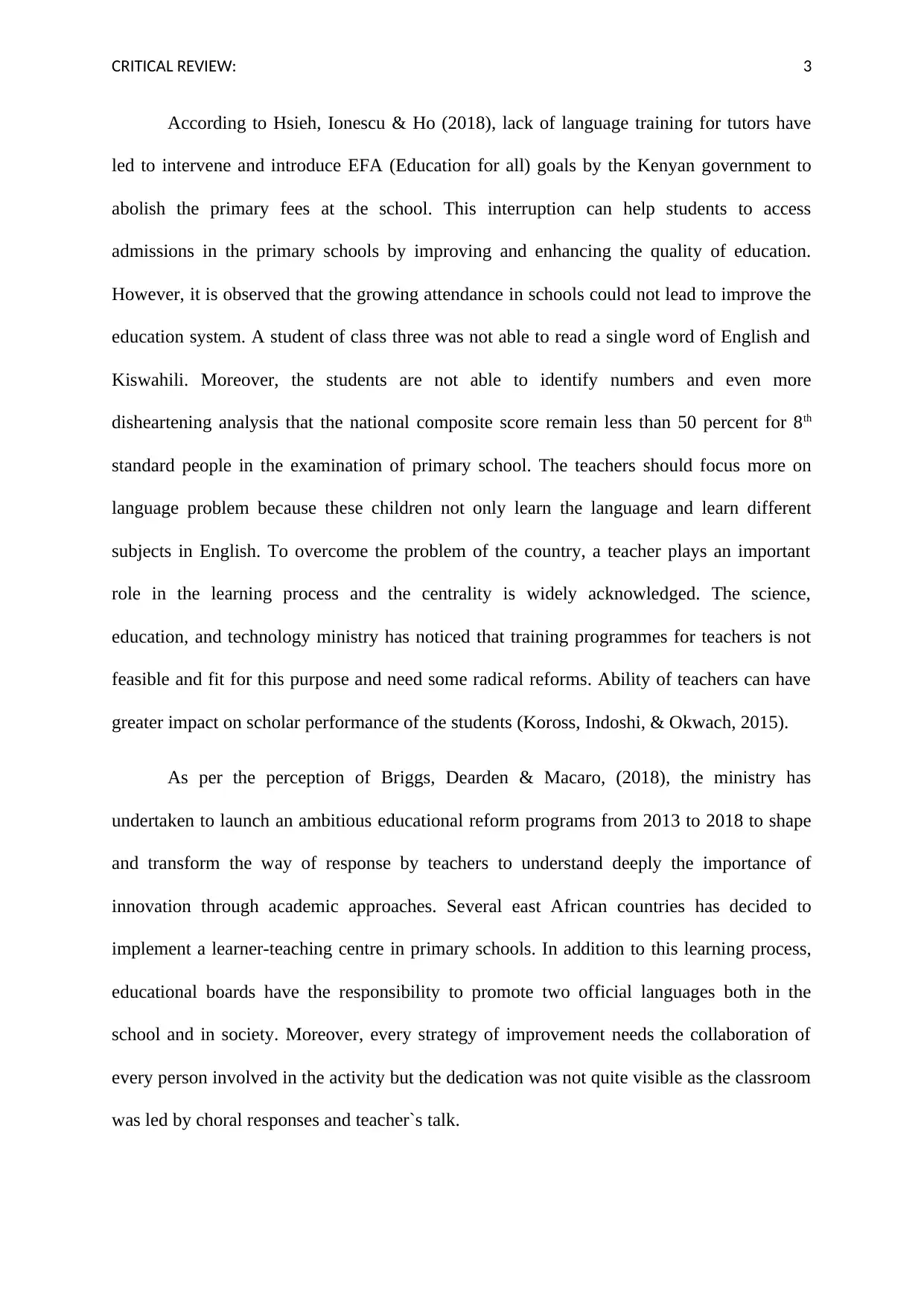
CRITICAL REVIEW: 3
According to Hsieh, Ionescu & Ho (2018), lack of language training for tutors have
led to intervene and introduce EFA (Education for all) goals by the Kenyan government to
abolish the primary fees at the school. This interruption can help students to access
admissions in the primary schools by improving and enhancing the quality of education.
However, it is observed that the growing attendance in schools could not lead to improve the
education system. A student of class three was not able to read a single word of English and
Kiswahili. Moreover, the students are not able to identify numbers and even more
disheartening analysis that the national composite score remain less than 50 percent for 8th
standard people in the examination of primary school. The teachers should focus more on
language problem because these children not only learn the language and learn different
subjects in English. To overcome the problem of the country, a teacher plays an important
role in the learning process and the centrality is widely acknowledged. The science,
education, and technology ministry has noticed that training programmes for teachers is not
feasible and fit for this purpose and need some radical reforms. Ability of teachers can have
greater impact on scholar performance of the students (Koross, Indoshi, & Okwach, 2015).
As per the perception of Briggs, Dearden & Macaro, (2018), the ministry has
undertaken to launch an ambitious educational reform programs from 2013 to 2018 to shape
and transform the way of response by teachers to understand deeply the importance of
innovation through academic approaches. Several east African countries has decided to
implement a learner-teaching centre in primary schools. In addition to this learning process,
educational boards have the responsibility to promote two official languages both in the
school and in society. Moreover, every strategy of improvement needs the collaboration of
every person involved in the activity but the dedication was not quite visible as the classroom
was led by choral responses and teacher`s talk.
According to Hsieh, Ionescu & Ho (2018), lack of language training for tutors have
led to intervene and introduce EFA (Education for all) goals by the Kenyan government to
abolish the primary fees at the school. This interruption can help students to access
admissions in the primary schools by improving and enhancing the quality of education.
However, it is observed that the growing attendance in schools could not lead to improve the
education system. A student of class three was not able to read a single word of English and
Kiswahili. Moreover, the students are not able to identify numbers and even more
disheartening analysis that the national composite score remain less than 50 percent for 8th
standard people in the examination of primary school. The teachers should focus more on
language problem because these children not only learn the language and learn different
subjects in English. To overcome the problem of the country, a teacher plays an important
role in the learning process and the centrality is widely acknowledged. The science,
education, and technology ministry has noticed that training programmes for teachers is not
feasible and fit for this purpose and need some radical reforms. Ability of teachers can have
greater impact on scholar performance of the students (Koross, Indoshi, & Okwach, 2015).
As per the perception of Briggs, Dearden & Macaro, (2018), the ministry has
undertaken to launch an ambitious educational reform programs from 2013 to 2018 to shape
and transform the way of response by teachers to understand deeply the importance of
innovation through academic approaches. Several east African countries has decided to
implement a learner-teaching centre in primary schools. In addition to this learning process,
educational boards have the responsibility to promote two official languages both in the
school and in society. Moreover, every strategy of improvement needs the collaboration of
every person involved in the activity but the dedication was not quite visible as the classroom
was led by choral responses and teacher`s talk.
Paraphrase This Document
Need a fresh take? Get an instant paraphrase of this document with our AI Paraphraser
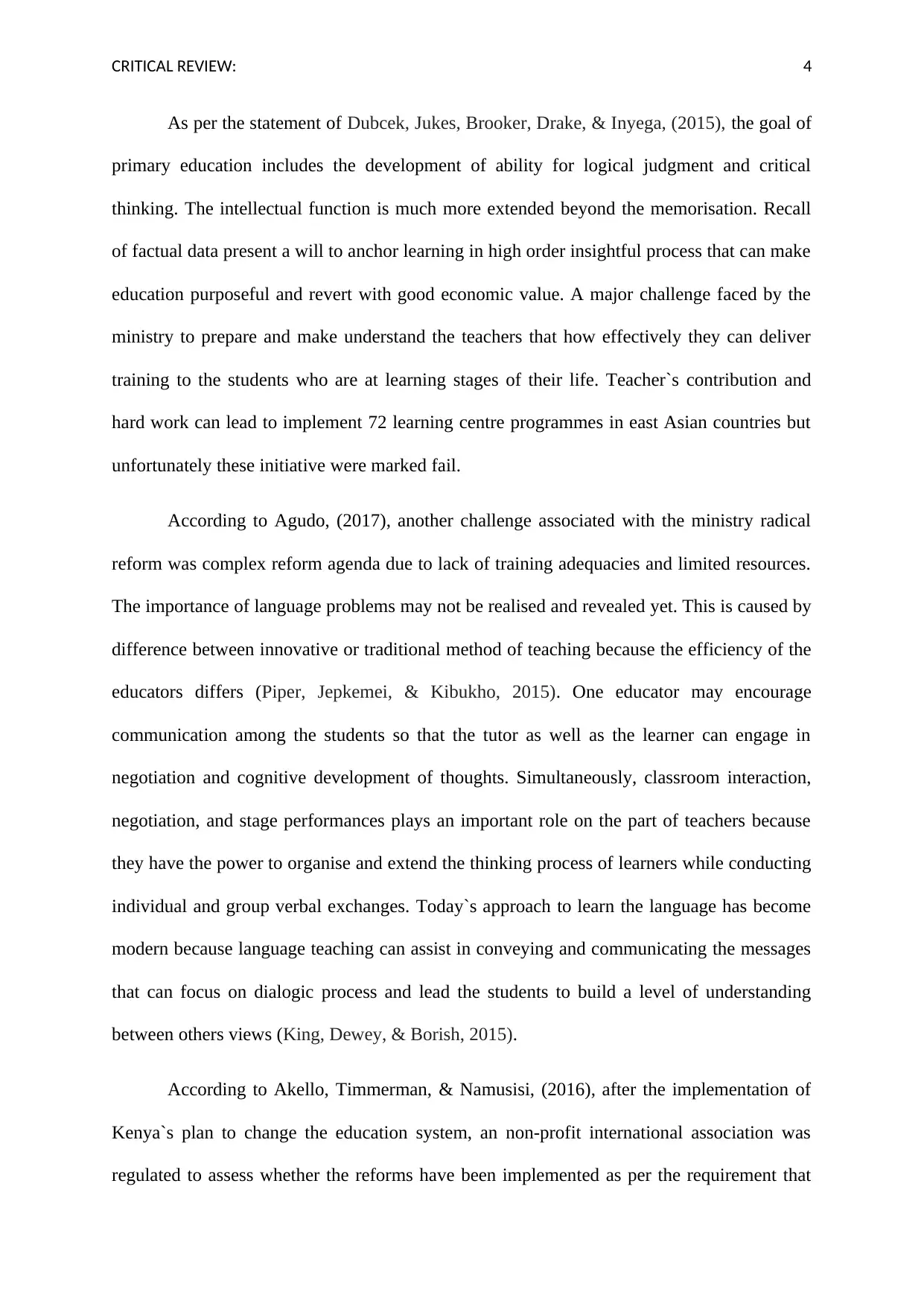
CRITICAL REVIEW: 4
As per the statement of Dubcek, Jukes, Brooker, Drake, & Inyega, (2015), the goal of
primary education includes the development of ability for logical judgment and critical
thinking. The intellectual function is much more extended beyond the memorisation. Recall
of factual data present a will to anchor learning in high order insightful process that can make
education purposeful and revert with good economic value. A major challenge faced by the
ministry to prepare and make understand the teachers that how effectively they can deliver
training to the students who are at learning stages of their life. Teacher`s contribution and
hard work can lead to implement 72 learning centre programmes in east Asian countries but
unfortunately these initiative were marked fail.
According to Agudo, (2017), another challenge associated with the ministry radical
reform was complex reform agenda due to lack of training adequacies and limited resources.
The importance of language problems may not be realised and revealed yet. This is caused by
difference between innovative or traditional method of teaching because the efficiency of the
educators differs (Piper, Jepkemei, & Kibukho, 2015). One educator may encourage
communication among the students so that the tutor as well as the learner can engage in
negotiation and cognitive development of thoughts. Simultaneously, classroom interaction,
negotiation, and stage performances plays an important role on the part of teachers because
they have the power to organise and extend the thinking process of learners while conducting
individual and group verbal exchanges. Today`s approach to learn the language has become
modern because language teaching can assist in conveying and communicating the messages
that can focus on dialogic process and lead the students to build a level of understanding
between others views (King, Dewey, & Borish, 2015).
According to Akello, Timmerman, & Namusisi, (2016), after the implementation of
Kenya`s plan to change the education system, an non-profit international association was
regulated to assess whether the reforms have been implemented as per the requirement that
As per the statement of Dubcek, Jukes, Brooker, Drake, & Inyega, (2015), the goal of
primary education includes the development of ability for logical judgment and critical
thinking. The intellectual function is much more extended beyond the memorisation. Recall
of factual data present a will to anchor learning in high order insightful process that can make
education purposeful and revert with good economic value. A major challenge faced by the
ministry to prepare and make understand the teachers that how effectively they can deliver
training to the students who are at learning stages of their life. Teacher`s contribution and
hard work can lead to implement 72 learning centre programmes in east Asian countries but
unfortunately these initiative were marked fail.
According to Agudo, (2017), another challenge associated with the ministry radical
reform was complex reform agenda due to lack of training adequacies and limited resources.
The importance of language problems may not be realised and revealed yet. This is caused by
difference between innovative or traditional method of teaching because the efficiency of the
educators differs (Piper, Jepkemei, & Kibukho, 2015). One educator may encourage
communication among the students so that the tutor as well as the learner can engage in
negotiation and cognitive development of thoughts. Simultaneously, classroom interaction,
negotiation, and stage performances plays an important role on the part of teachers because
they have the power to organise and extend the thinking process of learners while conducting
individual and group verbal exchanges. Today`s approach to learn the language has become
modern because language teaching can assist in conveying and communicating the messages
that can focus on dialogic process and lead the students to build a level of understanding
between others views (King, Dewey, & Borish, 2015).
According to Akello, Timmerman, & Namusisi, (2016), after the implementation of
Kenya`s plan to change the education system, an non-profit international association was
regulated to assess whether the reforms have been implemented as per the requirement that
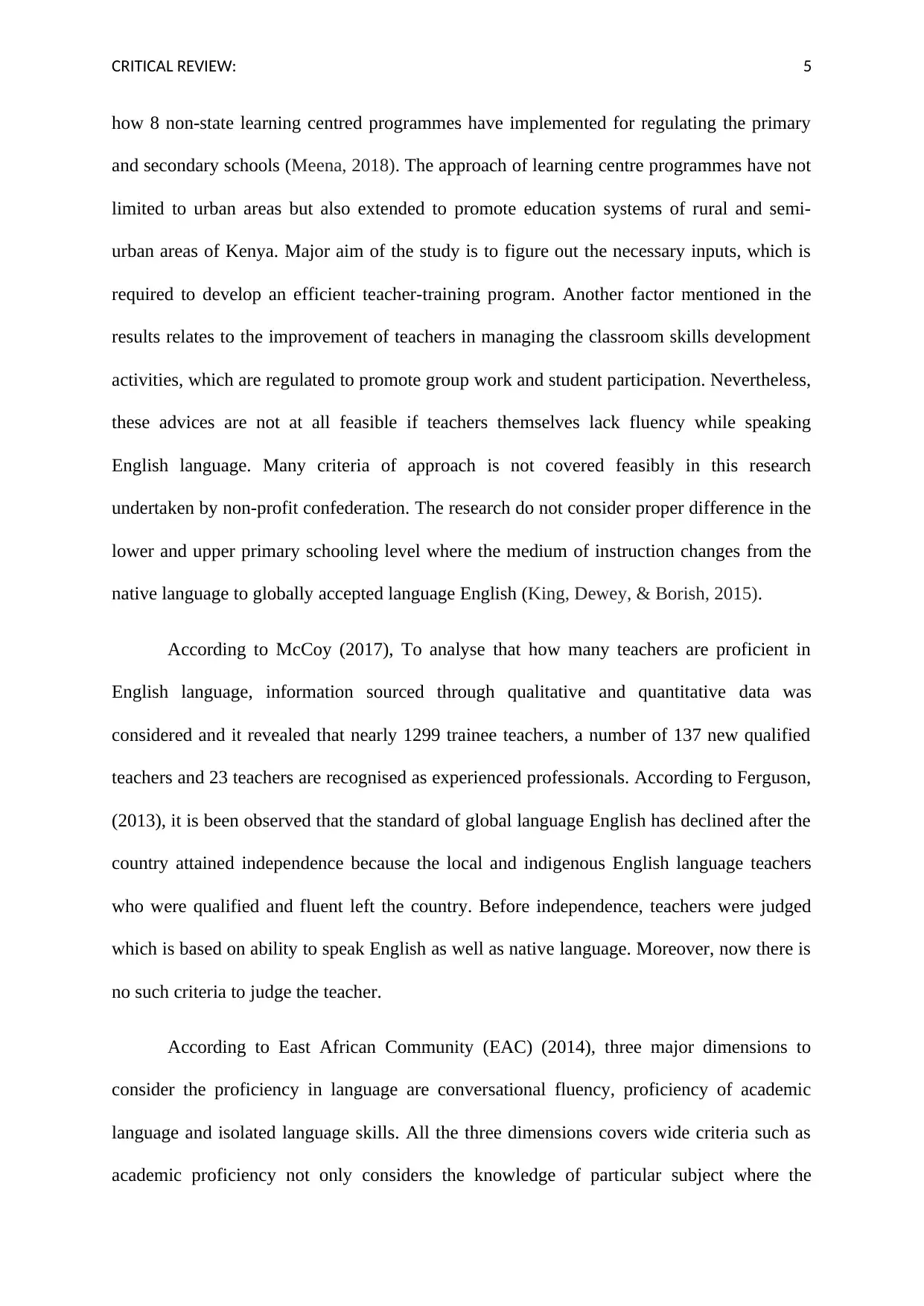
CRITICAL REVIEW: 5
how 8 non-state learning centred programmes have implemented for regulating the primary
and secondary schools (Meena, 2018). The approach of learning centre programmes have not
limited to urban areas but also extended to promote education systems of rural and semi-
urban areas of Kenya. Major aim of the study is to figure out the necessary inputs, which is
required to develop an efficient teacher-training program. Another factor mentioned in the
results relates to the improvement of teachers in managing the classroom skills development
activities, which are regulated to promote group work and student participation. Nevertheless,
these advices are not at all feasible if teachers themselves lack fluency while speaking
English language. Many criteria of approach is not covered feasibly in this research
undertaken by non-profit confederation. The research do not consider proper difference in the
lower and upper primary schooling level where the medium of instruction changes from the
native language to globally accepted language English (King, Dewey, & Borish, 2015).
According to McCoy (2017), To analyse that how many teachers are proficient in
English language, information sourced through qualitative and quantitative data was
considered and it revealed that nearly 1299 trainee teachers, a number of 137 new qualified
teachers and 23 teachers are recognised as experienced professionals. According to Ferguson,
(2013), it is been observed that the standard of global language English has declined after the
country attained independence because the local and indigenous English language teachers
who were qualified and fluent left the country. Before independence, teachers were judged
which is based on ability to speak English as well as native language. Moreover, now there is
no such criteria to judge the teacher.
According to East African Community (EAC) (2014), three major dimensions to
consider the proficiency in language are conversational fluency, proficiency of academic
language and isolated language skills. All the three dimensions covers wide criteria such as
academic proficiency not only considers the knowledge of particular subject where the
how 8 non-state learning centred programmes have implemented for regulating the primary
and secondary schools (Meena, 2018). The approach of learning centre programmes have not
limited to urban areas but also extended to promote education systems of rural and semi-
urban areas of Kenya. Major aim of the study is to figure out the necessary inputs, which is
required to develop an efficient teacher-training program. Another factor mentioned in the
results relates to the improvement of teachers in managing the classroom skills development
activities, which are regulated to promote group work and student participation. Nevertheless,
these advices are not at all feasible if teachers themselves lack fluency while speaking
English language. Many criteria of approach is not covered feasibly in this research
undertaken by non-profit confederation. The research do not consider proper difference in the
lower and upper primary schooling level where the medium of instruction changes from the
native language to globally accepted language English (King, Dewey, & Borish, 2015).
According to McCoy (2017), To analyse that how many teachers are proficient in
English language, information sourced through qualitative and quantitative data was
considered and it revealed that nearly 1299 trainee teachers, a number of 137 new qualified
teachers and 23 teachers are recognised as experienced professionals. According to Ferguson,
(2013), it is been observed that the standard of global language English has declined after the
country attained independence because the local and indigenous English language teachers
who were qualified and fluent left the country. Before independence, teachers were judged
which is based on ability to speak English as well as native language. Moreover, now there is
no such criteria to judge the teacher.
According to East African Community (EAC) (2014), three major dimensions to
consider the proficiency in language are conversational fluency, proficiency of academic
language and isolated language skills. All the three dimensions covers wide criteria such as
academic proficiency not only considers the knowledge of particular subject where the
⊘ This is a preview!⊘
Do you want full access?
Subscribe today to unlock all pages.

Trusted by 1+ million students worldwide
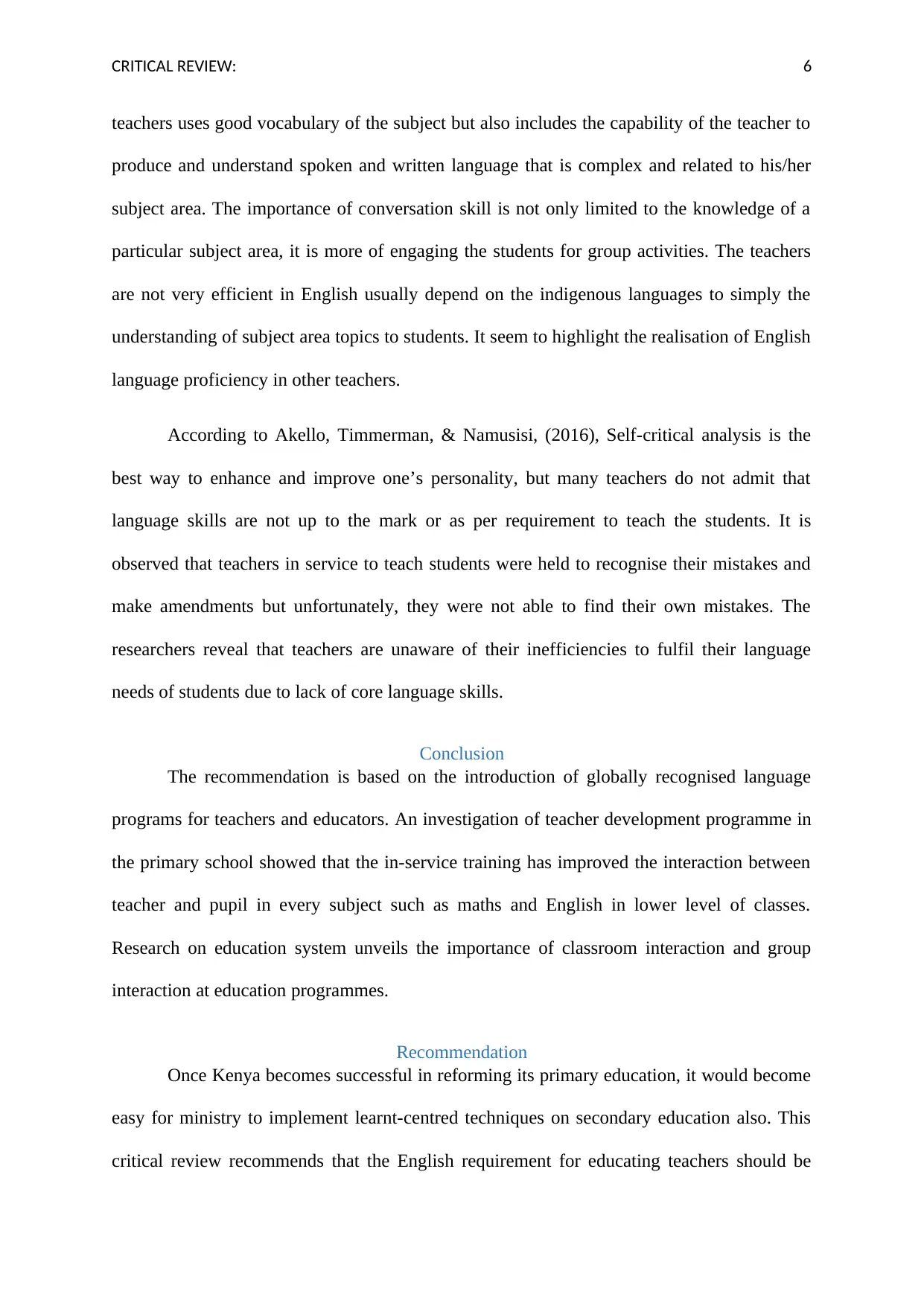
CRITICAL REVIEW: 6
teachers uses good vocabulary of the subject but also includes the capability of the teacher to
produce and understand spoken and written language that is complex and related to his/her
subject area. The importance of conversation skill is not only limited to the knowledge of a
particular subject area, it is more of engaging the students for group activities. The teachers
are not very efficient in English usually depend on the indigenous languages to simply the
understanding of subject area topics to students. It seem to highlight the realisation of English
language proficiency in other teachers.
According to Akello, Timmerman, & Namusisi, (2016), Self-critical analysis is the
best way to enhance and improve one’s personality, but many teachers do not admit that
language skills are not up to the mark or as per requirement to teach the students. It is
observed that teachers in service to teach students were held to recognise their mistakes and
make amendments but unfortunately, they were not able to find their own mistakes. The
researchers reveal that teachers are unaware of their inefficiencies to fulfil their language
needs of students due to lack of core language skills.
Conclusion
The recommendation is based on the introduction of globally recognised language
programs for teachers and educators. An investigation of teacher development programme in
the primary school showed that the in-service training has improved the interaction between
teacher and pupil in every subject such as maths and English in lower level of classes.
Research on education system unveils the importance of classroom interaction and group
interaction at education programmes.
Recommendation
Once Kenya becomes successful in reforming its primary education, it would become
easy for ministry to implement learnt-centred techniques on secondary education also. This
critical review recommends that the English requirement for educating teachers should be
teachers uses good vocabulary of the subject but also includes the capability of the teacher to
produce and understand spoken and written language that is complex and related to his/her
subject area. The importance of conversation skill is not only limited to the knowledge of a
particular subject area, it is more of engaging the students for group activities. The teachers
are not very efficient in English usually depend on the indigenous languages to simply the
understanding of subject area topics to students. It seem to highlight the realisation of English
language proficiency in other teachers.
According to Akello, Timmerman, & Namusisi, (2016), Self-critical analysis is the
best way to enhance and improve one’s personality, but many teachers do not admit that
language skills are not up to the mark or as per requirement to teach the students. It is
observed that teachers in service to teach students were held to recognise their mistakes and
make amendments but unfortunately, they were not able to find their own mistakes. The
researchers reveal that teachers are unaware of their inefficiencies to fulfil their language
needs of students due to lack of core language skills.
Conclusion
The recommendation is based on the introduction of globally recognised language
programs for teachers and educators. An investigation of teacher development programme in
the primary school showed that the in-service training has improved the interaction between
teacher and pupil in every subject such as maths and English in lower level of classes.
Research on education system unveils the importance of classroom interaction and group
interaction at education programmes.
Recommendation
Once Kenya becomes successful in reforming its primary education, it would become
easy for ministry to implement learnt-centred techniques on secondary education also. This
critical review recommends that the English requirement for educating teachers should be
Paraphrase This Document
Need a fresh take? Get an instant paraphrase of this document with our AI Paraphraser
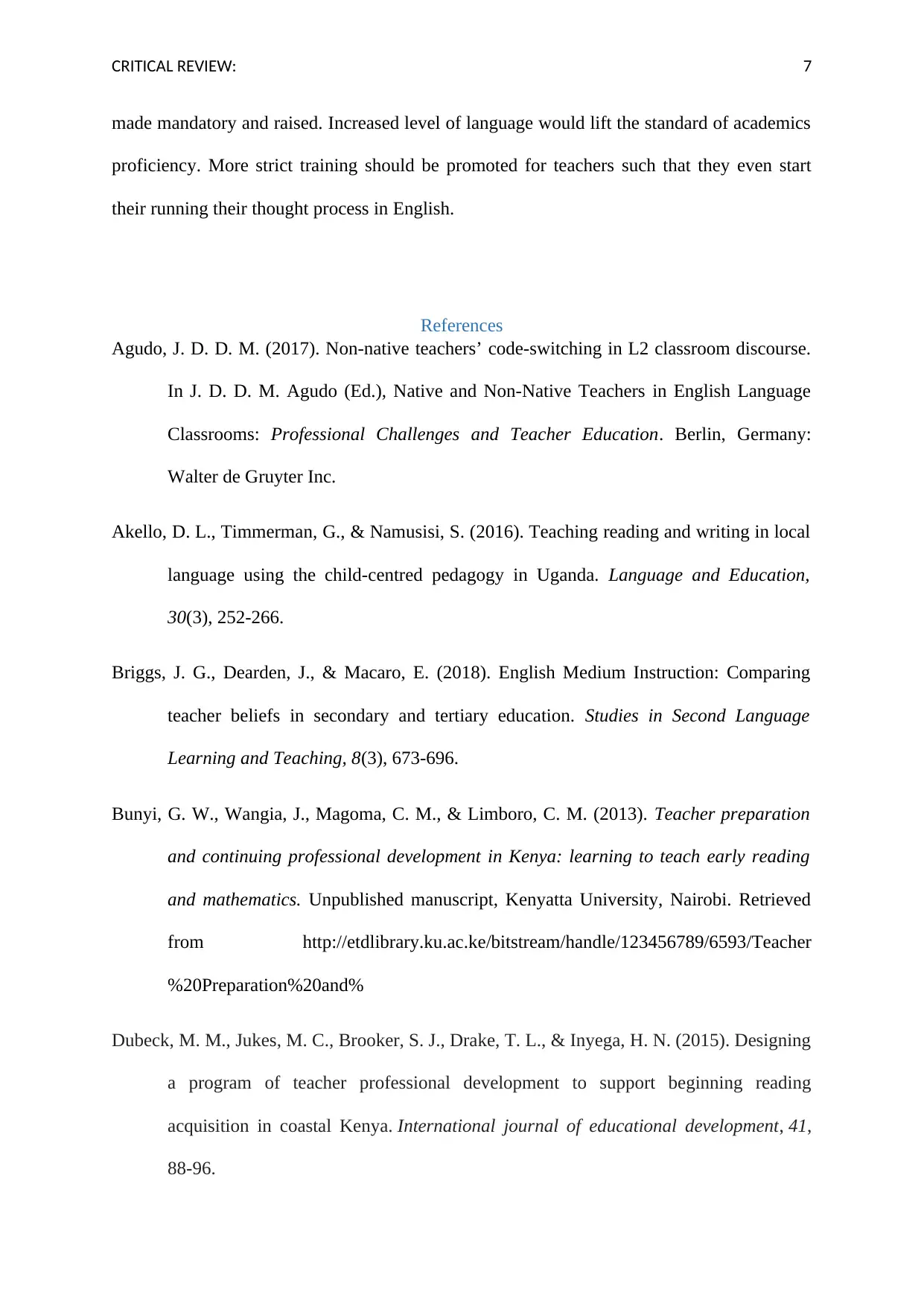
CRITICAL REVIEW: 7
made mandatory and raised. Increased level of language would lift the standard of academics
proficiency. More strict training should be promoted for teachers such that they even start
their running their thought process in English.
References
Agudo, J. D. D. M. (2017). Non-native teachers’ code-switching in L2 classroom discourse.
In J. D. D. M. Agudo (Ed.), Native and Non-Native Teachers in English Language
Classrooms: Professional Challenges and Teacher Education. Berlin, Germany:
Walter de Gruyter Inc.
Akello, D. L., Timmerman, G., & Namusisi, S. (2016). Teaching reading and writing in local
language using the child-centred pedagogy in Uganda. Language and Education,
30(3), 252-266.
Briggs, J. G., Dearden, J., & Macaro, E. (2018). English Medium Instruction: Comparing
teacher beliefs in secondary and tertiary education. Studies in Second Language
Learning and Teaching, 8(3), 673-696.
Bunyi, G. W., Wangia, J., Magoma, C. M., & Limboro, C. M. (2013). Teacher preparation
and continuing professional development in Kenya: learning to teach early reading
and mathematics. Unpublished manuscript, Kenyatta University, Nairobi. Retrieved
from http://etdlibrary.ku.ac.ke/bitstream/handle/123456789/6593/Teacher
%20Preparation%20and%
Dubeck, M. M., Jukes, M. C., Brooker, S. J., Drake, T. L., & Inyega, H. N. (2015). Designing
a program of teacher professional development to support beginning reading
acquisition in coastal Kenya. International journal of educational development, 41,
88-96.
made mandatory and raised. Increased level of language would lift the standard of academics
proficiency. More strict training should be promoted for teachers such that they even start
their running their thought process in English.
References
Agudo, J. D. D. M. (2017). Non-native teachers’ code-switching in L2 classroom discourse.
In J. D. D. M. Agudo (Ed.), Native and Non-Native Teachers in English Language
Classrooms: Professional Challenges and Teacher Education. Berlin, Germany:
Walter de Gruyter Inc.
Akello, D. L., Timmerman, G., & Namusisi, S. (2016). Teaching reading and writing in local
language using the child-centred pedagogy in Uganda. Language and Education,
30(3), 252-266.
Briggs, J. G., Dearden, J., & Macaro, E. (2018). English Medium Instruction: Comparing
teacher beliefs in secondary and tertiary education. Studies in Second Language
Learning and Teaching, 8(3), 673-696.
Bunyi, G. W., Wangia, J., Magoma, C. M., & Limboro, C. M. (2013). Teacher preparation
and continuing professional development in Kenya: learning to teach early reading
and mathematics. Unpublished manuscript, Kenyatta University, Nairobi. Retrieved
from http://etdlibrary.ku.ac.ke/bitstream/handle/123456789/6593/Teacher
%20Preparation%20and%
Dubeck, M. M., Jukes, M. C., Brooker, S. J., Drake, T. L., & Inyega, H. N. (2015). Designing
a program of teacher professional development to support beginning reading
acquisition in coastal Kenya. International journal of educational development, 41,
88-96.
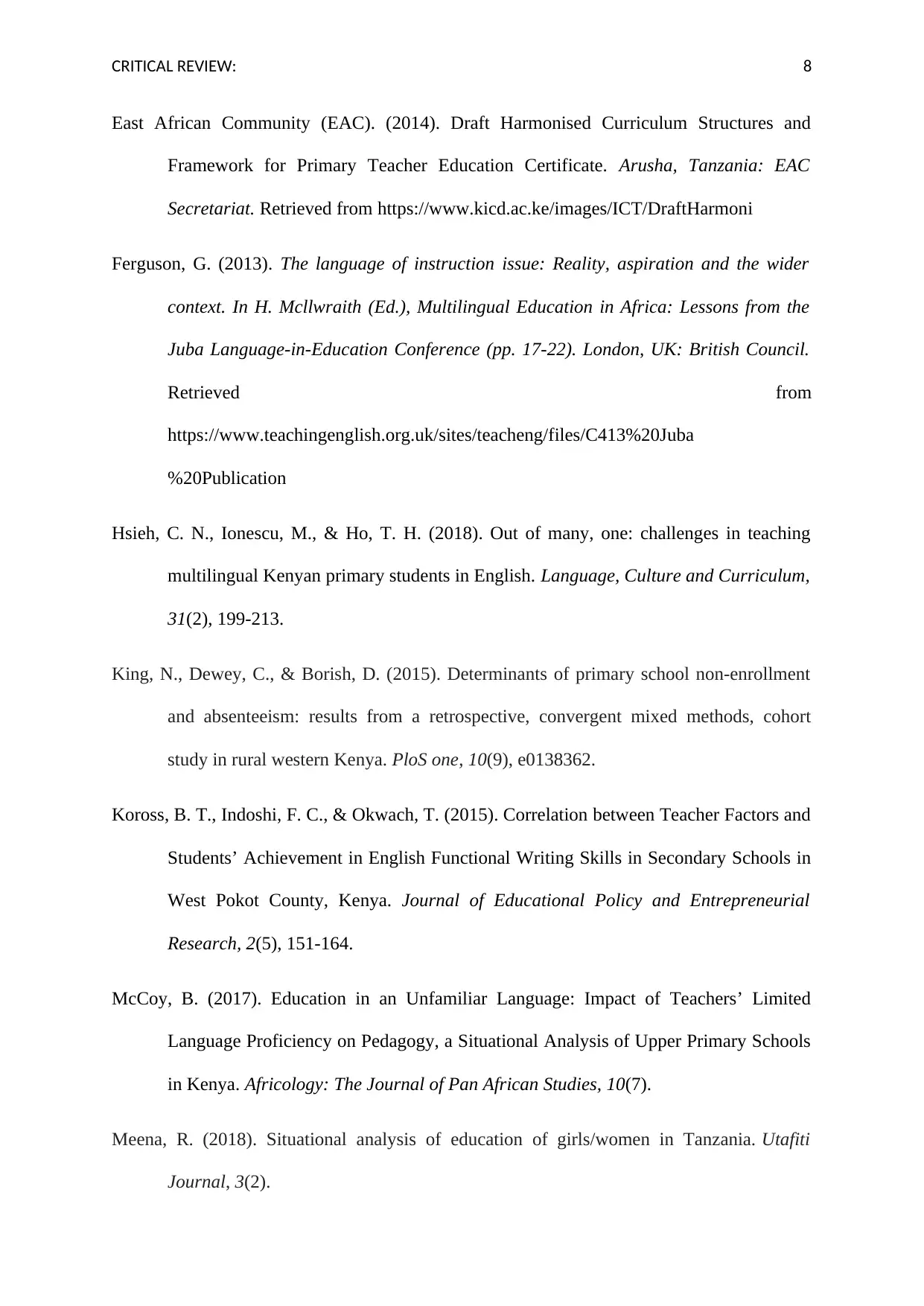
CRITICAL REVIEW: 8
East African Community (EAC). (2014). Draft Harmonised Curriculum Structures and
Framework for Primary Teacher Education Certificate. Arusha, Tanzania: EAC
Secretariat. Retrieved from https://www.kicd.ac.ke/images/ICT/DraftHarmoni
Ferguson, G. (2013). The language of instruction issue: Reality, aspiration and the wider
context. In H. Mcllwraith (Ed.), Multilingual Education in Africa: Lessons from the
Juba Language-in-Education Conference (pp. 17-22). London, UK: British Council.
Retrieved from
https://www.teachingenglish.org.uk/sites/teacheng/files/C413%20Juba
%20Publication
Hsieh, C. N., Ionescu, M., & Ho, T. H. (2018). Out of many, one: challenges in teaching
multilingual Kenyan primary students in English. Language, Culture and Curriculum,
31(2), 199-213.
King, N., Dewey, C., & Borish, D. (2015). Determinants of primary school non-enrollment
and absenteeism: results from a retrospective, convergent mixed methods, cohort
study in rural western Kenya. PloS one, 10(9), e0138362.
Koross, B. T., Indoshi, F. C., & Okwach, T. (2015). Correlation between Teacher Factors and
Students’ Achievement in English Functional Writing Skills in Secondary Schools in
West Pokot County, Kenya. Journal of Educational Policy and Entrepreneurial
Research, 2(5), 151-164.
McCoy, B. (2017). Education in an Unfamiliar Language: Impact of Teachers’ Limited
Language Proficiency on Pedagogy, a Situational Analysis of Upper Primary Schools
in Kenya. Africology: The Journal of Pan African Studies, 10(7).
Meena, R. (2018). Situational analysis of education of girls/women in Tanzania. Utafiti
Journal, 3(2).
East African Community (EAC). (2014). Draft Harmonised Curriculum Structures and
Framework for Primary Teacher Education Certificate. Arusha, Tanzania: EAC
Secretariat. Retrieved from https://www.kicd.ac.ke/images/ICT/DraftHarmoni
Ferguson, G. (2013). The language of instruction issue: Reality, aspiration and the wider
context. In H. Mcllwraith (Ed.), Multilingual Education in Africa: Lessons from the
Juba Language-in-Education Conference (pp. 17-22). London, UK: British Council.
Retrieved from
https://www.teachingenglish.org.uk/sites/teacheng/files/C413%20Juba
%20Publication
Hsieh, C. N., Ionescu, M., & Ho, T. H. (2018). Out of many, one: challenges in teaching
multilingual Kenyan primary students in English. Language, Culture and Curriculum,
31(2), 199-213.
King, N., Dewey, C., & Borish, D. (2015). Determinants of primary school non-enrollment
and absenteeism: results from a retrospective, convergent mixed methods, cohort
study in rural western Kenya. PloS one, 10(9), e0138362.
Koross, B. T., Indoshi, F. C., & Okwach, T. (2015). Correlation between Teacher Factors and
Students’ Achievement in English Functional Writing Skills in Secondary Schools in
West Pokot County, Kenya. Journal of Educational Policy and Entrepreneurial
Research, 2(5), 151-164.
McCoy, B. (2017). Education in an Unfamiliar Language: Impact of Teachers’ Limited
Language Proficiency on Pedagogy, a Situational Analysis of Upper Primary Schools
in Kenya. Africology: The Journal of Pan African Studies, 10(7).
Meena, R. (2018). Situational analysis of education of girls/women in Tanzania. Utafiti
Journal, 3(2).
⊘ This is a preview!⊘
Do you want full access?
Subscribe today to unlock all pages.

Trusted by 1+ million students worldwide
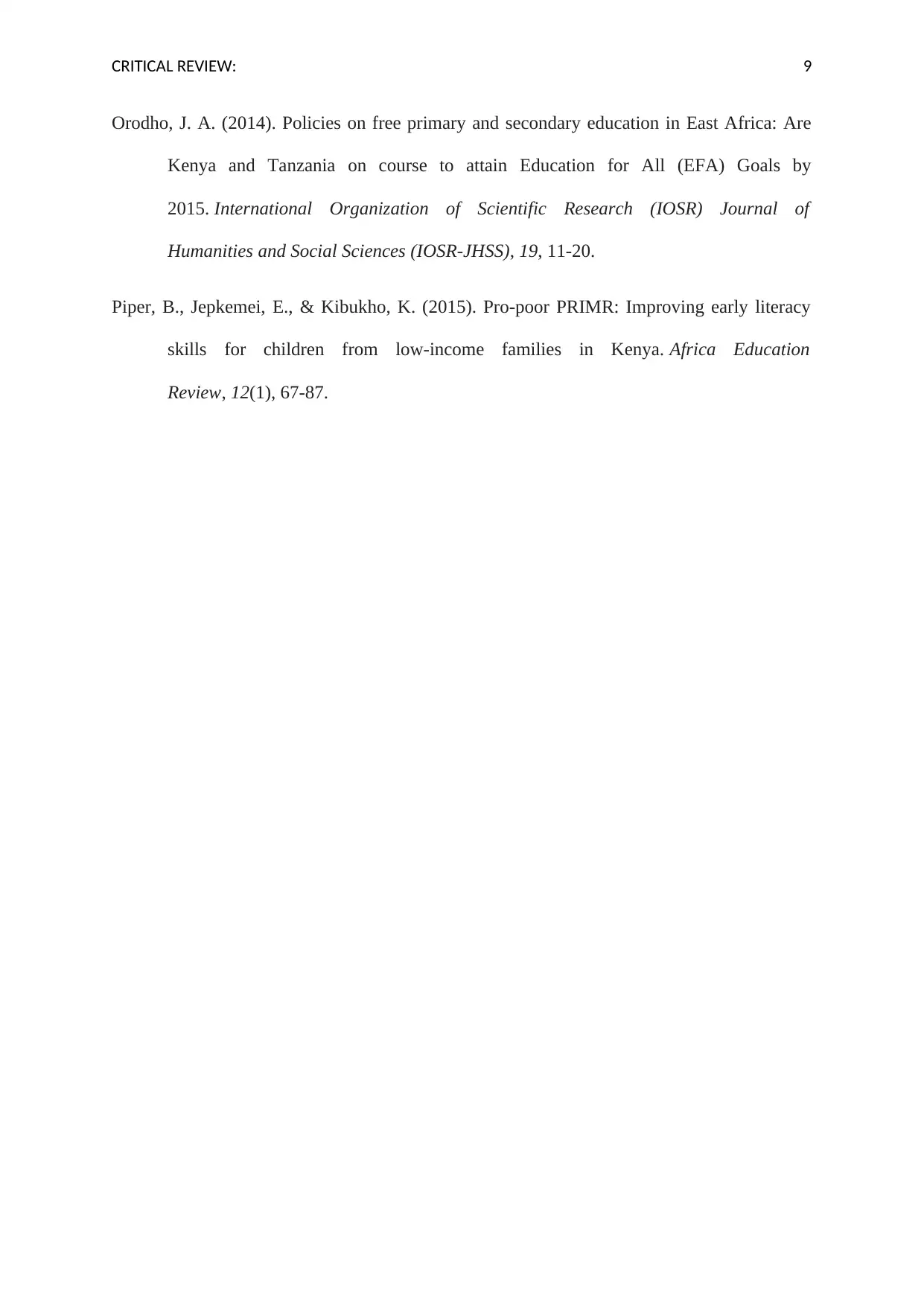
CRITICAL REVIEW: 9
Orodho, J. A. (2014). Policies on free primary and secondary education in East Africa: Are
Kenya and Tanzania on course to attain Education for All (EFA) Goals by
2015. International Organization of Scientific Research (IOSR) Journal of
Humanities and Social Sciences (IOSR-JHSS), 19, 11-20.
Piper, B., Jepkemei, E., & Kibukho, K. (2015). Pro-poor PRIMR: Improving early literacy
skills for children from low-income families in Kenya. Africa Education
Review, 12(1), 67-87.
Orodho, J. A. (2014). Policies on free primary and secondary education in East Africa: Are
Kenya and Tanzania on course to attain Education for All (EFA) Goals by
2015. International Organization of Scientific Research (IOSR) Journal of
Humanities and Social Sciences (IOSR-JHSS), 19, 11-20.
Piper, B., Jepkemei, E., & Kibukho, K. (2015). Pro-poor PRIMR: Improving early literacy
skills for children from low-income families in Kenya. Africa Education
Review, 12(1), 67-87.
1 out of 10
Related Documents
Your All-in-One AI-Powered Toolkit for Academic Success.
+13062052269
info@desklib.com
Available 24*7 on WhatsApp / Email
![[object Object]](/_next/static/media/star-bottom.7253800d.svg)
Unlock your academic potential
Copyright © 2020–2026 A2Z Services. All Rights Reserved. Developed and managed by ZUCOL.





